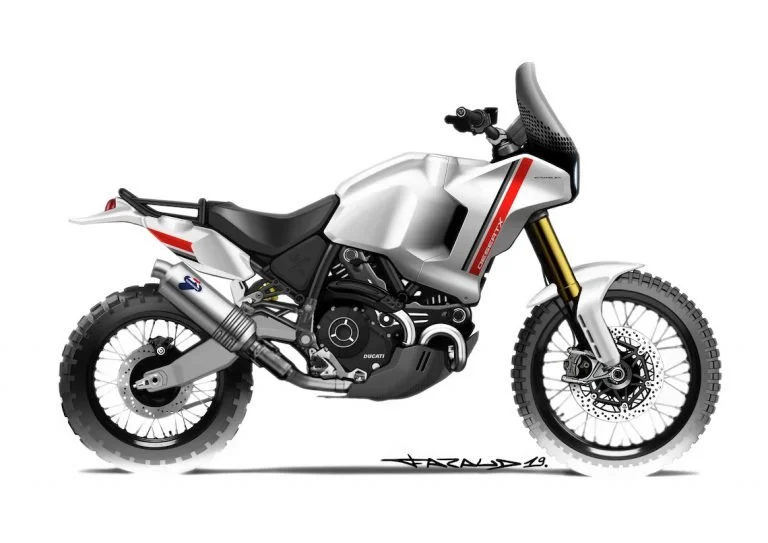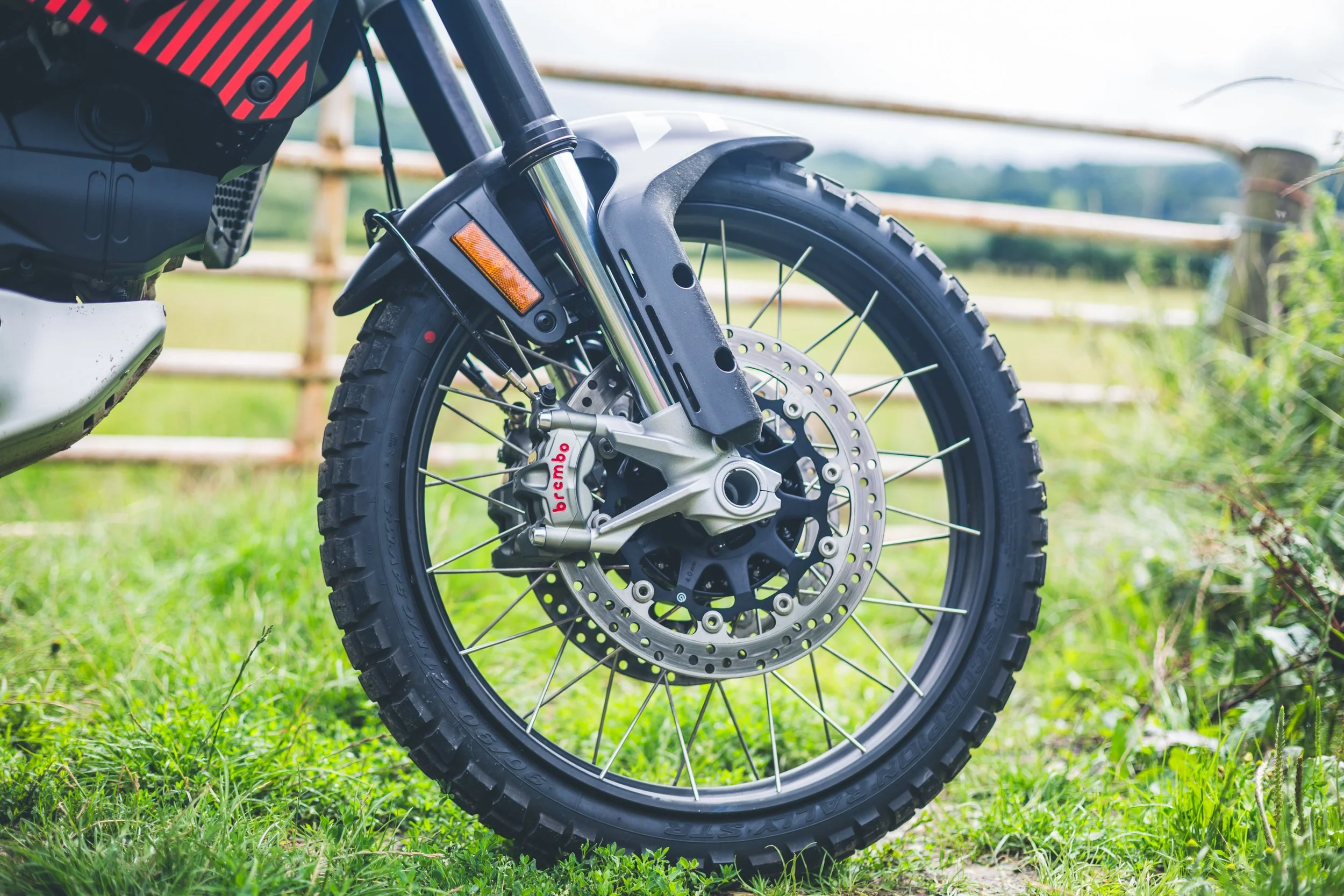Ducati Desert X - 90% of Buyers May Never Discover How Good it is.
The Concept in 2019
For automotive design fanatics, the world of concept cars and bikes can be devilishly cruel. I'm sure you can think of at least one incredible concept that either later materialised as a depressingly dulled-down version of the teaser previously shown or, even more tragically, one that made it only as far as the clay modelling suite… before being wheeled away to a corner of a museum.
In 2019, Ducati revealed a motorcycle concept that looked so good - very few people ever expected it to become a production bike. It was called ‘The Desert X’ and, for the purpose of the bike shows it was attending, it was made using an existing Ducati Scrambler chassis and framework and had Dakar-inspired fairings and trim bolted to it in homage to the late 80s-early 90s Cagiva Elefant.
The concept looked spectacular, and it was so outlandishly different to every other Ducati model on display. In keeping with concept model traditions, when the question of "Will this ever become an actual bike?" was aimed toward the Ducati staff on the event stands, the answer was a very polite "No. Almost certainly not, sorry."
But to everyone's surprise and delight, just three years (and a global pandemic) later, the production model Desert X was rolling into Ducati showrooms worldwide with a retail price of less than £15,000. Moreover, the production model actually resembled the concept, making it one of the most exciting new bikes in recent years.
The concept model was a parts-room-raid based on the existing Scrambler, and like most other people who jumped for joy upon hearing that the Desert X was soon to become a real-world production model, I assumed it was to go into production as precisely that - a Scrambler with some extra off-road bits bolted on. But no, Ducati decided to engineer the Desert X from the ground up, taking the already brilliant V twin engine from the Multistrada V2 and SuperSport and making everything else from scratch.
Everything else on the new bike is 'new', including a dedicated chassis, tubular frame, fuel tank, foot pegs, handlebars, screens, switch gear, and even the instrument cluster screen is unique to the model. And it's not only the impressive new parts and components; the rider development and engineering of the bike are also very significant.
A 21-inch front wheel sits between the front 46mm upsidedown forks to help with off-road ability and agility. The rear wheel is 3 inches smaller at 18 inches, meaning getting over obstacles and tackling rough terrain is a breeze. The suspension is adjustable, but only mechanically, with no fancy electronic trickery to be found, which helps to keep the retail prices down. At its lowest point, the Desert X sump guard sits 25cm off the ground, which is excellent news for anyone wanting to tackle the occasional fallen branch, rock or extra-high curbstone on the local high street.
Rider modes are plentiful and, at a glance, might seem excessive. In addition to the usual Ducati ‘Sport’, ‘Urban’ and ‘Wet’ road modes, the Desert X also has ‘Enduro’ and ‘Rally’ modes, developed especially for venturing off the beaten track. Other hardware elements can be manually adjusted according to on or off-road riding, such as handlebar angle adjustment and rear brake adjustment to suit riding whilst standing.
It's the design and styling of the bike that sets it apart from other Enduro-style adventure bikes. It is, in my opinion, by far the best-looking in the range. The halo or angel eye style headlight surrounds give a futuristic feel whilst offering a subtle nod to the Elefant twin headlamp styling from the 1980s. The fuel tank and front fairing are near-brutalist and angular, complementing the exposed tubular framework, and in keeping with Ducati traditions, the list of optional extras is vast. One option is an additional auxiliary fuel tank that fits to the rear of the bike, wrapping up and around the pillion seat. This extra tank rewards riders going the extra mile away from civilisation with an additional 8 litres of fuel capacity on top of the already impressive 21-litre tank up front. Beyond the added practicality, it also looks incredibly cool, especially in the white colour scheme. There are also multiple option packs for things like touring, rallying and urban riding. It's difficult to imagine an environment where the Desert X wouldn't fit in or work.
What makes the Desert X especially unique is that 80% of the rider development has been conducted exclusively off-road, making it perfect for anyone hoping to enjoy a bit of green laning or the occasional adventure across a desert. This off-road focus left only 20% of the development for the tarmac. Despite this, Ducati predicts that only around 10% of paying customers will take their Desert X through anything more than a muddy puddle in their ownership, and this made me feel a little bit sad.
On the day I took delivery of the Desert X, I decided attempting an on-road review would be a little futile and, above all, probably a bit boring. Instead, I opted to see how easy it would be to take off-road by utilising a green lane near my home in Warwickshire. Of course, an adventure like this wouldn't count unless it was documented on camera, too, right?
Poorly prepared and dangerously inexperienced, I found myself riding the brand new £14,000 press bike I'd just collected to a muddy, bog-ridden lane with a section of steep and slippery uphill sections and enough low-hanging branches to drastically change the design of my beautiful new Arai crash helmet. Of course, I would only find out the true extent of the lane's challenges once I'd ridden it... for the very first time... later that day. A terrible idea? Perhaps.
With Enduro mode selected, allowing for a bit of rear wheel slip and non-invasive ABS braking, I soon found myself hurtling along the muddy lane with the back wheel spinning and squirming on the variable grip beneath me. Standing up on the bike feels reassuringly intuitive, even when powering around the muddy corners and with the back end stepping out. Despite being a total rookie in this off-road environment, the Desert X felt reassuringly capable - far more capable than me, that's for sure. Nothing felt alarming, and nothing felt particularly scary. Above all else - I was having fun and giggling inside my crash helmet like a naughty toddler.
What makes the bike remarkable is the instantaneous transition and ease of hopping out of the mud and back onto the tarmac. In fitting with the 10% statistic, for my ten-day test ride, I'd be exclusively on the road nine of the ten days. And despite only 20% road development, the Desert X feels just as at home on Terrafirma. I used the bike to commute between podcasting locations, some of which were hundreds of miles apart. For spirited road riding and filtering through traffic, it soaks it all up with ease and powering along country lanes turned out to be quite an addictive scenario, often adding an unnecessary hour or so to a couple of journeys as a result of ' needing to try that road once more'.
The Desert X feels as special to ride as it does to look at. It's a bike that can do it all - and do it all brilliantly. Admittedly, as a taller rider (6' 1 / 185cm), I'd have been more comfortable at motorway speeds with a slightly taller front aero screen (this is an option waiting to be ticked). As is an option for a shorter seat - ideal for riders who might be a little daunted by the bike's tall height.
One option I'd definitely be ticking is the Termignoni exhaust option. Whilst the 937cc V-Twin engine makes a good induction honk, the exhaust tone could offer a little more and potentially unlock a little more power.
Where the Desert X might grind a few gears is the requirement to visit the dealership for trivial service work. According to the service book, minor work such as air filter and brake pad changes require a visit to the local dealership. One could argue that for a bike with an optional-extra auxiliary fuel tank, it's a strange requirement. I can't imagine that many Ducati service centres will be tucked conveniently between the sand dunes to help clear your air filter or swap your brake pads out on a mid-desert exploration adventure. Or, perhaps it's not an issue in the grand scheme of things if Ducati's 10% off-roader prediction turns out to be true.
Above all, the Ducati has done what few bike or car makers rarely achieve. They've produced a product that looks as cool as the concept with the additional very excellent bonus of being absolutely exceptional to ride.
words: John Marcar
pictures: Henry Faulkner-Smith
WATCH OUR VIDEO FEATURE HERE:























